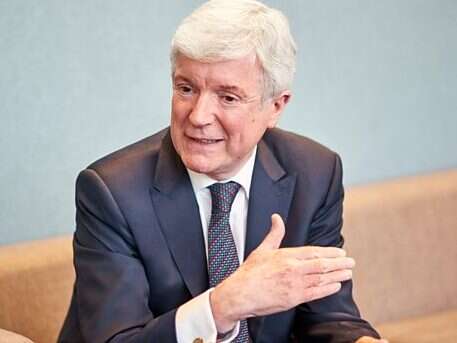
Tony Hall’s time as director-general of the BBC has not been mired in media scandal as his predecessor’s tenure was, but the corporation is not without turmoil as he prepares to leave in six months.
It is of course a far cry from when Lord Hall took over as director-general in 2013 from George Entwhistle, who had been in the job for 54 days during which time the Jimmy Savile and Lord McAlpine scandals hit.
The latter was wrongly implicated as a paedophile by Newsnight; the former never rightly so until the story was broken elsewhere.
Nonetheless the BBC has come under fire from a number of different directions of late, which together might have encouraged Lord Hall of Birkenhead to step down sooner than planned.
Politics and political coverage
His departure could be an attempt to smooth tensions between the broadcaster and Boris Johnson’s newly installed Tory majority government, which has threatened to review the BBC’s licence fee funding model.
Lord Hall, 68, has consistently defended the licence fee, much to the chagrin of the printed press who would cheerfully see it gone, to avoid the BBC being cast out into the cold of commercial broadcasting.
A new head of the BBC is a chance for a fresh start with Johnson and will likely be the person to lead the BBC’s charter renewal negotiations with ministers ahead of 2027 when the current agreement ends.
The BBC faced repeated claims of political bias during last month’s election, which it strongly rejected on all fronts.
Lord Hall’s departure also offers up a rolling head after the BBC’s failure to secure Johnson for an interview with Andrew Neil – seen as a key test for any prospective PM – during last month’s election campaign.
It led to Neil openly calling out Johnson on air after all other party leaders appeared for a head-to-head with the veteran political broadcaster.
Equal pay
Another area of contention has been the BBC’s handling of equal pay claims that have arisen since it first published a list of its top-earning on-air talent salaries in 2017, exposing a sometimes substantial gender divide.
The BBC has repeatedly denied breaching the Equality Act 2010, which enshrines equal pay for equal work in law, but has been busy correcting salary disputes with payouts behind closed doors.
It emerged today that former BBC Radio 4 Today presenter Sarah Montague had won a £400,000 settlement and an apology from the BBC after being treated “unequally” by them for many years.
The corporation was also dealt a serious blow this month when an employment tribunal ruled it had discriminated against Newswatch presenter Samira Ahmed as a result of her gender, paying her six times less per episode than Points of View presenter Jeremy Vine for equal work.
All this has happened under Lord Hall’s watch and despite attempts to heal the rift, such as the 50:50 gender pledge for on-air talent, it is an issue that has continued to dog the BBC amid criticism of how it has handled the matter and the opaqueness of its pay process.
The vacancy left by Lord Hall provides an opportunity for the BBC to appoint its first ever female director-general, with diversity already a watchword as it moves forward into a new decade.
Free licence fee for over-75s
Lord Hall is also the architect of cuts to the licence fee for over-75s, which has proven a deeply unpopular policy, although one the BBC has said should not have fallen on its head but rather the Government’s.
MPs said Lord Hall’s handling of the negotiations had been “flawed”.
Announcing his departure earlier today, Lord Hall said it had been a “hard decision” to leave, but said the BBC’s “mission is secure until 2027”.
Nonetheless the BBC continues to face the challenge of digital disruption, which has brought about changing viewer/listener/reader habits. It now competes with the likes of Netflix and Youtube for eyeballs more than it competes with other broadcasters, mirroring the tech platform battles of the press.
Trust and reaching younger audiences have been the oft repeated mantra of the BBC under Lord Hall. Efforts have already been made to this effect – the creation of the BBC Sounds app for one – but his successor will need to carry on the fight if the BBC is to secure its footing in the digital age.
Meanwhile Lord Hall will leave those worries behind him when he takes on the role of chairman of the board of Trustees of the National Gallery.
Picture: BBC
Email pged@pressgazette.co.uk to point out mistakes, provide story tips or send in a letter for publication on our "Letters Page" blog

